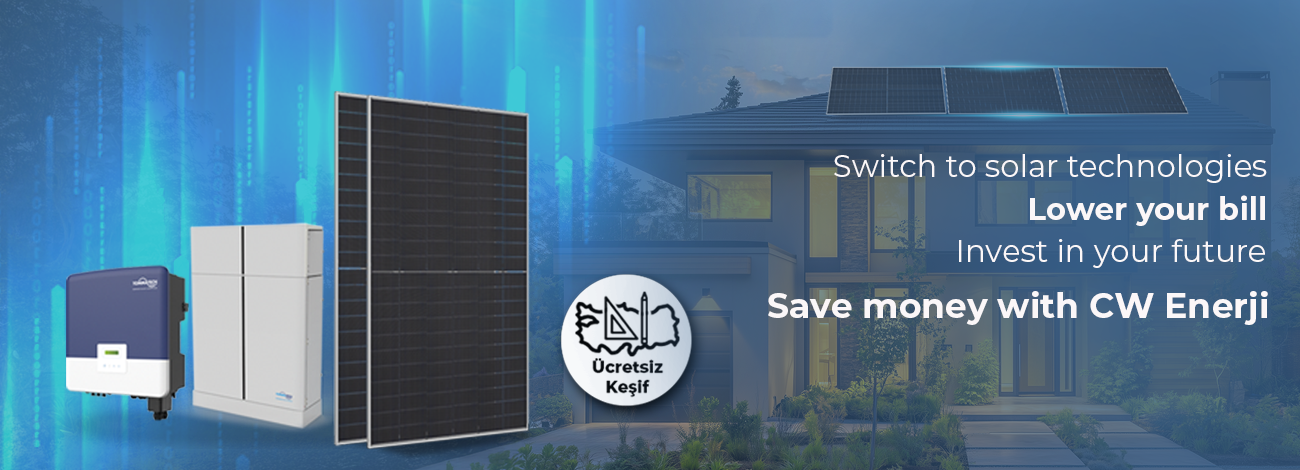

Solar energy is one of the most effective ways to get rid of high electricity costs and provide energy independence. The sun is an unlimited and free energy source offered to us by nature. With the advancement of technology, solar panels have become more efficient, more durable and suitable for every budget. You can gain your economic freedom by controlling your energy production! Considering the increasing energy prices in today's world and the negative effects of fossil fuels on the environment, solar energy offers a safe, economical and sustainable energy solution for both individual and commercial users in the long term.
Thanks to solar panels, you can save money in the long term by generating your own electricity and control your energy costs. Moreover, you can generate additional income by selling excess electricity to the grid, making your energy system even more profitable. Solar energy can not only save money, but also be a passive earning door in the long term! Moreover, by diversifying your energy sources, you can reduce your dependence on the grid and increase your energy supply security. You can sustain your life with the energy you produce without being affected by power cuts. Thus, you can be prepared against energy crises and offer a safe and sustainable energy alternative to those around you.
You can use the following communication channels
for all your applications and questions
The increase in bills leads individuals to renewable energy sources. At this point, solar energy is one of the most ideal alternatives both economically and environmentally. Solar energy contributes to the budget by reducing energy costs in the long term after the initial installation cost. In addition, it reduces carbon emissions with its environmentally friendly structure and offers a more sustainable life.
Long-term cost savings: Solar energy systems,After the initial cost, it contributes significantly to the budget by reducing electricity bills to zero in the long term with low operating costs.
Independence from price fluctuations:Since solar energy is a completely natural and renewable resource, it is not affected by increases and fluctuations in market prices and provides energy independence to the user.
Environmentally friendly energy production: Unlike fossil fuels, solar energy reduces carbon emissions and offers a sustainable life by producing energy without harming nature.
The increase in electricity costs leads individuals to meet their energy needs more economically and sustainably. At this point, solar energy offers an ideal alternative for individuals and small-scale businesses. Here are the solar energy systems that can be preferred on this scale:
Rooftop Solar Energy Systems:
They are the most common systems used in homes and small-scale commercial enterprises. Thanks to solar panels mounted on roofs, users can meet their own electricity needs and significantly reduce energy costs. Excess generated energy can also be sold to the grid to generate additional income.
On-Grid (Grid Connected) Systems:
These systems, which provide the opportunity to use grid electricity together with solar energy, are ideal for homes and small businesses that need uninterrupted energy. In cases where sunlight is insufficient, energy continuity is ensured by receiving support from the grid.
These systems offer a strong alternative for individuals and businesses looking for a more economical solution for reasons such as rising electricity bills and operating costs. Switching to solar energy not only eases the burden on the budget by controlling electricity costs in the long term, but also helps businesses maintain their competitiveness. It also protects users from price fluctuations and high costs by providing energy independence.
The increase in electricity costs encourages individuals and businesses to install solar energy systems. Solar installation is a process that requires proper planning and expertise. Here are the general steps:
Determination of Energy Needs:
Before starting the installation, the monthly energy consumption of the users is analysed. Consumption amounts in electricity bills are the basic data in determining the required solar panel capacity.
Selection and Examination of Suitable Area:
For rooftop systems, the durability of the roof, angle and sunshine duration are evaluated.
For land-type systems, an area of suitable width and non-shading is selected. Expert teams plan the most efficient placement by making a technical examination of the area.
Selection of Solar Panels and Equipment:
The right panel type (monocrystalline, polycrystalline or bifacial), inverter, battery and other equipment are selected according to the user's needs. For example, battery systems are recommended for users who want to store energy.
Installation and Assembly:
The panels are securely mounted on the roof or on the ground.
Placing the inverter and making connections with the panels.
Connection to the electricity grid or battery integration in off-grid systems.
Testing and Commissioning of the System:
After the installation is completed, all connections and functionality of the system are tested. After making sure that it works smoothly, energy production starts.
Maintenance and Cleaning:
Solar energy systems require regular maintenance and cleaning to maintain efficiency. Cleaning the surface of the panels from dust and dirt increases energy production.
It makes solar energy a powerful option to combat rising energy costs. By switching to clean energy, you can both protect your budget and lead an environmentally friendly life in the long term.
Solar energy provides energy independence and ensures that you are not affected by price fluctuations. It also allows you to leave a more sustainable world to future generations by reducing fossil fuel consumption.